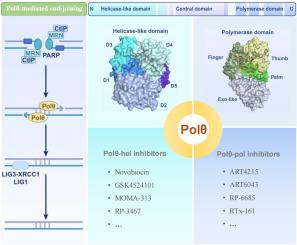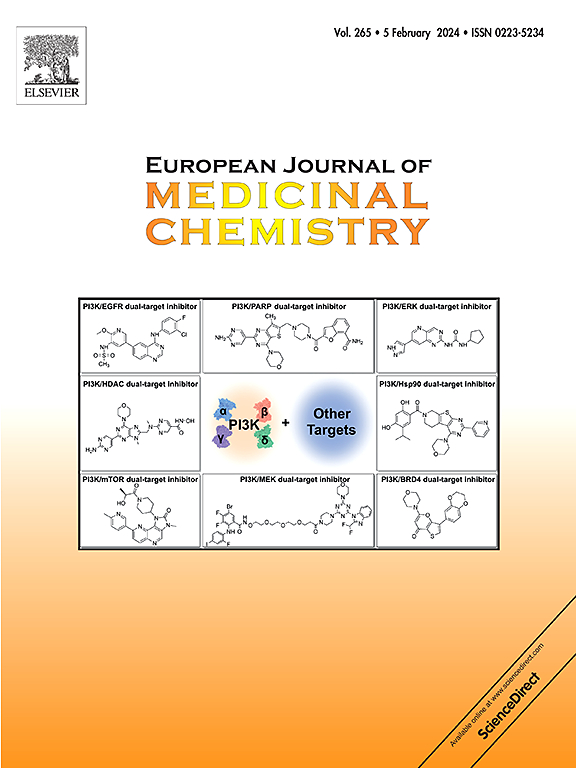Polymerase theta (Polθ) and cancer: Role in tumor progression and potential as a therapeutic target
IF 5.9
2区 医学
Q1 CHEMISTRY, MEDICINAL
引用次数: 0
Abstract
DNA double-strand breaks (DSBs) are a severe form of DNA damage that can lead to large chromosomal deletions, gene inactivation, genomic rearrangements, and cell death. Cellular repair pathways are vital for maintaining genomic stability and integrity, both of which are essential for cell growth and development. Recent studies highlight that DNA polymerase theta (Polθ) is a promising target in cancer research, as inhibiting Polθ is synthetically lethal in the context of homologous recombination (HR) deficiencies, such as mutations in the breast cancer susceptibility genes BRCA1 and BRCA2. Exploring the relationship between Polθ and cancer may offer new therapeutic strategies. This review outlines the mechanisms of DSB repair pathways, with a focus on the role of Polθ in polymerase theta-mediated end-joining (TMEJ). We also discuss the structure and biological functions of Polθ, emphasizing the synthetic lethal interactions between Polθ and various DNA repair genes in cancer therapy. Furthermore, we examine the types and therapeutic effects of Polθ inhibitors in tumor treatment, as well as their clinical applications and challenges. Although further research is required to resolve challenges in clinical applications, investigating Polθ inhibitors as targeted therapies could have implications for anticancer therapies, particularly in HR-deficient cancers.

聚合酶θ (Polθ)与癌症:在肿瘤进展中的作用和作为治疗靶点的潜力
DNA双链断裂(DSBs)是一种严重的DNA损伤形式,可导致大量染色体缺失、基因失活、基因组重排和细胞死亡。细胞修复途径对于维持基因组的稳定性和完整性至关重要,这两者对于细胞生长和发育都是必不可少的。最近的研究强调,DNA聚合酶theta (Polθ)是癌症研究中一个很有前景的靶点,因为在同源重组(HR)缺陷的情况下,如乳腺癌易感基因BRCA1和BRCA2突变,抑制Polθ是致命的。探索Polθ与癌症之间的关系可能会提供新的治疗策略。本文综述了DSB修复途径的机制,重点介绍了Polθ在聚合酶theta介导的末端连接(TMEJ)中的作用。我们还讨论了Polθ的结构和生物学功能,强调了Polθ与各种DNA修复基因在癌症治疗中的合成致死相互作用。此外,我们还研究了Polθ抑制剂在肿瘤治疗中的类型和治疗效果,以及它们的临床应用和挑战。尽管需要进一步的研究来解决临床应用中的挑战,但研究Polθ抑制剂作为靶向治疗可能会对抗癌治疗,特别是hr缺陷癌症的治疗产生影响。
本文章由计算机程序翻译,如有差异,请以英文原文为准。
求助全文
约1分钟内获得全文
求助全文
来源期刊
CiteScore
11.70
自引率
9.00%
发文量
863
审稿时长
29 days
期刊介绍:
The European Journal of Medicinal Chemistry is a global journal that publishes studies on all aspects of medicinal chemistry. It provides a medium for publication of original papers and also welcomes critical review papers.
A typical paper would report on the organic synthesis, characterization and pharmacological evaluation of compounds. Other topics of interest are drug design, QSAR, molecular modeling, drug-receptor interactions, molecular aspects of drug metabolism, prodrug synthesis and drug targeting. The journal expects manuscripts to present the rational for a study, provide insight into the design of compounds or understanding of mechanism, or clarify the targets.

 求助内容:
求助内容: 应助结果提醒方式:
应助结果提醒方式:


